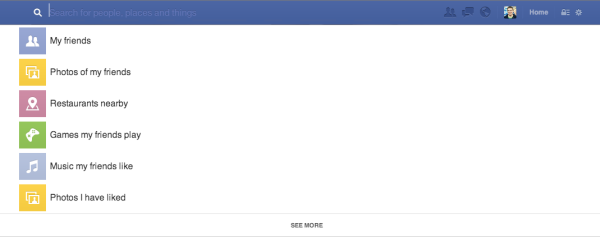Social media's biggest player made a pretty big announcement yesterday. Facebook released news that had people waiting in anticipation for weeks. Yesterday, Zuckerberg and his team announced a new product, a kind of search engine they are calling "Graph Search". According to Facebook, this new search engine, which is still in beta, "allows people to use the graph to make new connections". This new feature will be gradually rolled out.
Graph Search is quite different than web search. It is a different kind of search that allows you the "ability to provide you answer and not links that MAY have answers", according to Zuckerberg. So let's take a look at Facebook Graph Search, search quality, and the new meaning of a "like" for individuals and businesses.
How Graph Search works.
Currently there are four main focuses of search. They are: people, photos, interests and places.
- People Search. This is similar to the "Find Friend" toolbar that let users find friends by different cities, schools, employers etc. It is relaunched as part of People Search. Here are some search term examples: "friends who live in my city," "friends of friends who have been to New York," "people who like what I like".
- Photo Search. Users can search for specific photos. Search examples: "photos I like," "photos of my friends," "photos of the Golden Gate Bridge".
- Interest Search. Examples: "music my friends like," "movies my friends like," "books read by friends".
- Places Search. Users can search for places by location. Search examples: "restaurants in Boston," "countries my friends have visited,".
Here's an image of what the format looks like from Facebook

The idea is that Facebook has enough data that people can find whatever they want on the social networking site. It will be a completely new way to get info out of Facebook and fundamentally different than web search. It will lead people to use Facebook in entirely new ways: finding a date, new job openings, new restaurants, and other new businesses in their areas or anywhere in the country.
Zuckerberg said that this push into search is actually a return to the company's roots, "When I first made Facebook, we actually offered some functionality that was like this but only for your college," he said. "Facebook then was arguably as much for meeting new people around you and exploring your community as it was for keeping in touch with the people you already knew. But it was such a hard problem to do it for more than a few thousand people at a time. We transitioned from connecting with whoever you wanted to primarily staying with people you already knew. But Graph Search is like the grown-up version of that discovery aspect. Exploring your community is a core human need, and this is the first big step we're taking in that direction." Facebook will utilize social signals to create a unique and comprehensive social search experience.
While there has been some skepticism (privacy concerns, naturally), it is an interesting product. With Facebook's Graph Search, it's taking our existing behavior and incorporating it into the results without us having to do much of anything else. Basically, it is crowd-sourcing our lives. It is also safe to say that the feature results will most likely improve based upon how people actually use it.
What does this mean for businesses and individuals? Going forward, be careful of what you "like" and "share" on Facebook. The businesses, photos, and other information that you "like" and "share" on Facebook will likely impact future search results. There is a new meaning to "likes" on Facebook. Make sure the things in your profile actually reflect your interests.